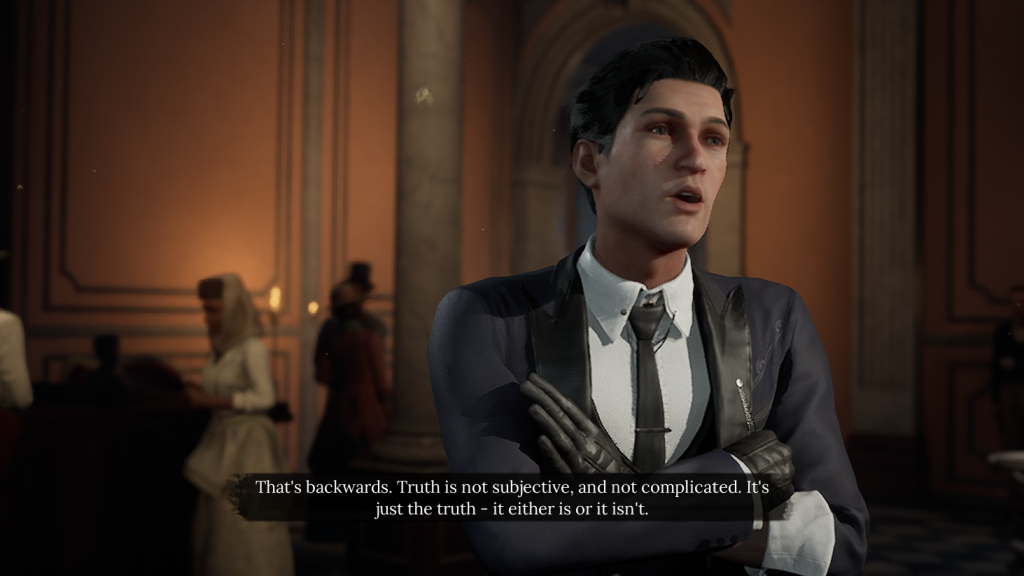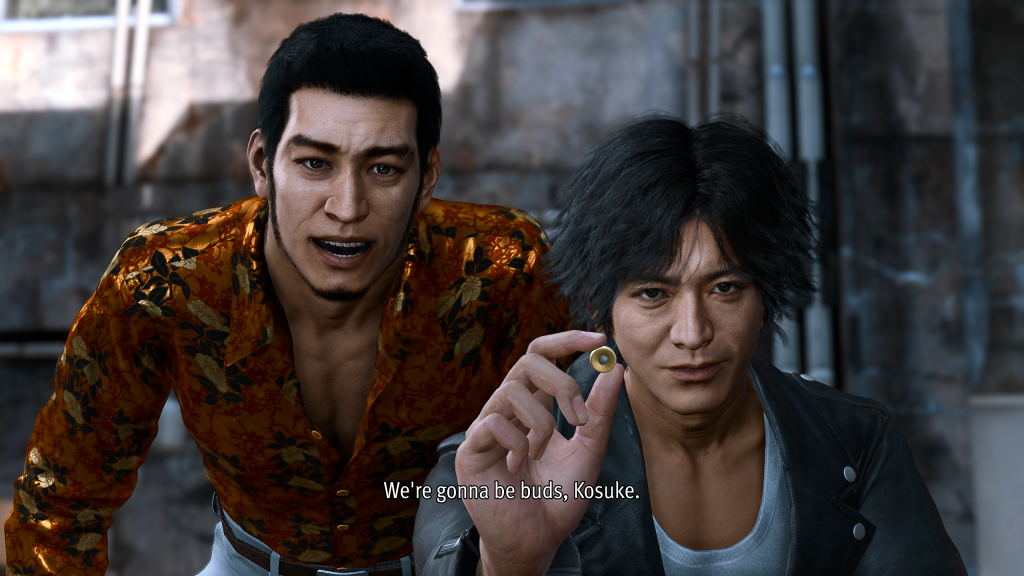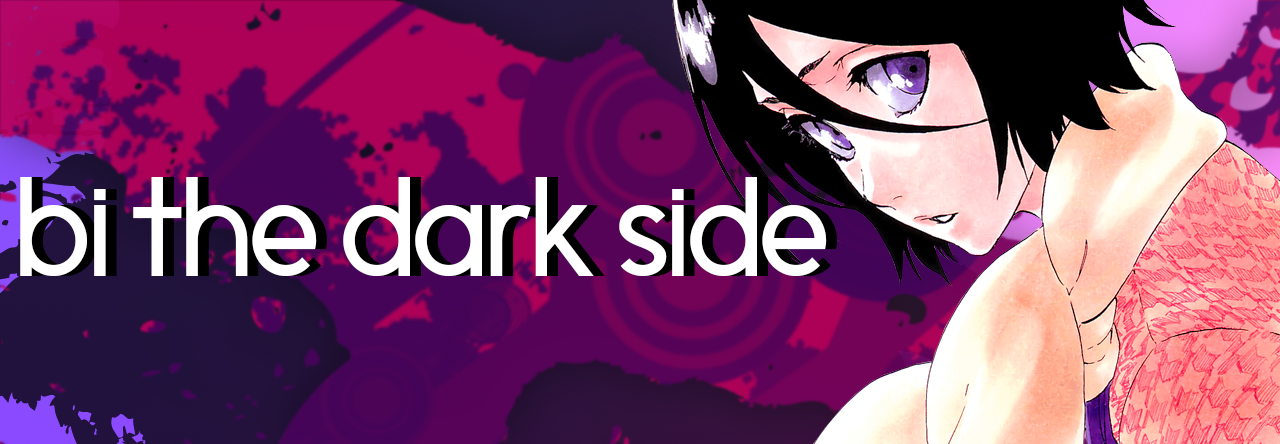Detective games are cool. I’ve played a good bunch of them, and as of recent, I’ve had the pleasure to play four games that create an interesting contrast. Two of them are Ryu Ga Gotoku Studios’ Judgment series, and the other two are the new reboot timeline for Frogwares’ Sherlock Homes series, Chapter One and a remake of The Awakened, their Cthulhu themed caper from 2006 now done up in Chapter One‘s mechanics and look. The two franchises have stories that contrast heavily in how they approach what a detective is, and it’s especially interesting with Lost Judgment and The Awakened due to both of them examining the baseline formulas created with classic Sherlock Holmes stories.
Chapter One and Judgment are already a pretty nifty pair to compare, both of them following detectives on the younger side (well, Yagami is young for a Like A Dragon protag) who can take part in scuffles alongside putting pieces together. They’re both on journeys that force them to deal with their past, and have more masculine counterpart companions – though Kaito gets the advantage over Jon for actually being real.

Yagami is very much the modern idea of a detective, and Sherlock the classic one. Yagami is a man of the people, growing up on the streets and struggling to get by, and taking on huge odds to chase the truth because it’s what he sees as right. Sherlock, on the other hand, is an eccentric from a well off family who initially became a detective due to an obsession with puzzles and solving problems, his moral stances there but often in a more realist, logical foundation.
Yagami does employ a lot of Sherlock’s observation and deduction methods, but the majority of his story has him approaching things like the Dragon of Dojima – going from place to place to ask direct questions, and beat them out if it comes to blows. Most of the major developments in the case come from Yagami talking things out with the team, getting different perspectives and coming up with theories that take into account threads they didn’t notice from their single perspectives. This has the problem that Yagami doesn’t come off as a particularly talented detective in this entry for a lot of the game, his kung-fu solving questions more than his eye for detail. He also does a lot more leg work when he does do detective work, like tailing or chasing suspects.

Sherlock has a battle minigame, where he uses his concentration to spot weak points on enemies and shoot off their armor to get them in an easy take down state. It fits his character, and is usually a last resort option. The majority of his time is spent looking over crime scenes, following leads at archives, testing chemicals, and putting together answers from information gathered. He’s the classic sleuth, seeing what everyone else misses, and bringing the truth to light, though he also has moral judgments to make there and what justice carried out means to him (where Yagami tends to stop once someone enters the system). He’s simply not an action hero or near superhuman fighting machine, but he will enter a dangerous situation if needed.
Both also end up in very different situations in their respective sequels. Lost Judgment was a rough time for Yagami, but he ultimately came out on top, while Sherlock’s Eldrich Adventure Part Two: Battle Tendency…no so much, without getting into spoilers. They’re both darker entries then their first one, and have the leads get into conflicts challenging their very core as detectives. Yagami ends up dealing with a vigilante circle that ended up opening a far larger case well beyond their scope, one faction looking for justice denied by the system, and the other baked deep into that system, acting for its favor. Sherlock, on the other hand, is hunting down a Cthulhu cult, and in the process, having to deal with the history of mental illness in his family as he questions if the evils beyond the veil or real or not.

More importantly, Yagami’s connections to his allies feel superficial. He handles a lot of the story himself, his allies offering support but often sidelined and not offering much else beyond gadgets (until the head breaking finale). Yagami is challenged and gets put through the wringer, but comes out fighting for what he believes is right, for a justice that doesn’t revolve a broken system or the blind rage at it. Heck, Kaito is in a hospital bed for a lot of the story. The only time they really feel substantial are in the school stories, where all the characters from the collective ten cases gather together to help in the finale, doing something Yagami couldn’t do himself, an act of community more like the first game’s focus on Yagami finding strength in his allies.
The Awakened has Sherlock at his lowest, and the story slowly shifting to giving Watson more agency and a larger impact on events. Rather then the two being sleuth and sidekick, this version of the legendary duo evens out the dynamic, both having their strengths and weaknesses, and needing the other to prop them up. Where Yagami and Kaito’s personal stuff is more or less in check (leaving aside Kaito’s DLC), Sherlock and Watson help each other out with their own severe traumas, creating a powerful bond that manages to possibly overcome madness itself, though not without battle scars.

Both games also seem interested in taking the idea of Sherlock Holmes, what a story with the character is supposed to be and offering unique spins that shake up the formula. In Lost Judgment‘s school stories, there’s constant reference to Sherlock and Moriarty from two detective fiction fans, with Yagami often forced into Sherlock roles, even wearing disguises more than usual. It’s taking the old tropes and applying them to a modern lens, creating a variety of goofy situations, some slowly revealing darker mysteries at the core. More importantly, while there is one major criminal group at the core of these stories, the truth of the matter is often based around people trying to come to terms with loss, trauma, failure, or learning a life lesson in their youth. Sherlock Holmes, in this framing, is an outside agent who can bring stagnant stories to satisfying resolutions, dragging the truth out and helping others confront it.
The Awakened flips this by making the potential truth horrifying. The context of this remake is unique, as we are no longer playing a Sherlock late in his career, but one still fairly fresh, only just having finished his personal visit to Cordona in Chapter One. That game also revealed a wrinkle in this continuity, that being Sherlock’s family has a history of mental illness. His mother lost her mind (without getting into spoilers), and Sherlock has a fear of the same happening to him. In a cosmic horror story where knowledge causes one to lose their sanity, you can probably see how this changes things.

Lost Judgment had a pretty classic look at what a detective is and what Sherlock Holmes stands for, oddly. While Yagami has a lot of modern touches, when you get down to it, he’s more an avatar of an ideal in this game then a fleshed out character. He carries out what he believes to be justice, taking on various antagonists, with little change to who he is this time around. Sherlock, on the other hand, is more human then he has ever been, vulnerable and eventually scared, cracking under the pressure of this reality defying case. He’s still who he’s always been, a puzzle obsessed recluse with a heart of gold buried under the snark and lack of manners, but now he’s dealing with very human problems (ironically while investigating something that may be magical).
Most importantly, these two series are each consistent. Lost Judgment not having an arc for Yagami is simply because he already had one, and now we’re seeing the end result of that arc. He’s had the same sort of arc as Kazuma Kiryu, going from a flawed person to more of a nearly inhuman legend that can completely flip a situation on its head. Chapter One went with a more personal story based around Sherlock’s childhood, and this new version of The Awakened uses that new foundation to further explore him as a character and see how this can change up dynamics and make a new, fresh take on the old classics.

We’ve ended up in unexpected places in both cases, taking inspiration from the same sources. Frogwares was inspired by wider Sherlock media and various other works, mystery and otherwise, while RGG Studios took inspiration from all over the mystery and legal drama genres, which were in turn inspired by the foundations of the original adventures of Sherlock Holmes. The fact the two studios have ended up at such different takes on the detective is fascinating, and I want to see more from both of them in the future, and where their unique takes may go.
